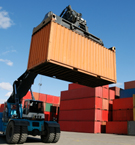How to Choose Storage Trailers
There are three main questions you need to answer before you're ready to choose storage trailers:
- How much space do you have? Measure the available room for your trailer before making any final decisions. Having one delivered only to find that it partially blocks a driveway or sidewalk is an expensive and embarrassing mistake. Make sure to measure any restricted access points that might cause delivery problems.
- How much does it need to store? A storage trailer is an inexpensive way to add storage space - knowing exactly how much stuff you have to store will help you choose the right size. Look through the inventory or equipment you want to store so you have an estimate of how much space you need.
- How long do you need it for? 80% to 90% of storage trailers are leased, not sold. Knowing how long you'll need yours for will help determine the price you'll pay and availability. Are you storing excess inventory for a month or two? Or adding storage space for a year or more?

Storage trailers are inexpensive ways to add storage space.
Once you know these answers, you can consider the size and type of storage trailers you need.
How to choose storage trailers sizes
Storage trailers are available in widths of 8' to 14' and lengths of 16' to 60'. The most common is the 12' x 60' single wide. Other common sizes are 8' x 24', 8' x 36', 10' x 30', 10' x 40' or 42', 12' x 50', and the 24' x 60' double wide. Talk to the dealers you're evaluating to see what size they recommend for your storage needs.
One important caveat: not all dealers measure size the same way. To best compare sizes, make sure your dealers are quoting you sizes based on the size of the box - the usable floor space. Some dealers include the trailer "tongue" in their measurements - that's the piece that connects to a hitch for towing - and that adds four feet. While knowing that external dimension is useful for site planning, that extra four feet does not give you any more space inside. You should specifically ask for both internal and external dimensions.
A 12' x 60' single wide storage trailer has 720 sq ft of floor space. The total amount you can fit in a given trailer depends on the type of shelving you choose, the size of the materials you're storing, and your access needs -- do you need to leave an aisle, so you can access any of the materials at any time, or can you simply fill the space back to front?
Storage trailers vs. containers
Wheels or no wheels? That much is obvious. But beyond that, there are a few subtle differences that provide unique advantages. Here's how the two stack up:
Size - Storage containers measure 8' wide and 7' 8" wide for narrow models. In contrast, storage trailers are a bit wider, commonly measuring 8' 6" wide or 102" wide in the wider variety. This leaves ample room when loading two rows of pallets side by side.
Height - Storage trailers are at loading dock level, enabling the quick, easy loading and unloading from a raised platform; storage containers rest at ground level and would require a small ramp to accommodate loading vehicles.
Stackable - Storage trailers can't be stacked; storage containers can be, making them far more cost-effective from a space standpoint.
Movable - With a semi truck and a quick hookup, storage trailers can be moved around a single location, making them much easier to load from multiple areas within a single site. Storage containers can also be moved but require a tilt bed truck or flatbed lift each time they need to be repositioned.
Licensing - Storage trailers are considered a commercial motor vehicle and must be licensed, adhering to width and length regulations established by the Federal Highway Administration (FHWA); storage containers do not require licensing.
Save money when you choose storage trailers
Smart business purchasing is usually about striking a balance between cost and quality, and for many types of purchases, quality is a more important consideration. However, because storage trailers are usually leased and only used for storage, in this case price is probably the most important consideration.
You do need to make sure that the trailer is weatherproof and secure to protect your belongings, so always visit the dealer before order a trailer. To find multiple storage trailer dealers in your area, fill out our free request for storage trailer price quotes and you'll be on your way to getting the best deal.
Ready to Compare Storage Containers Price Quotes?